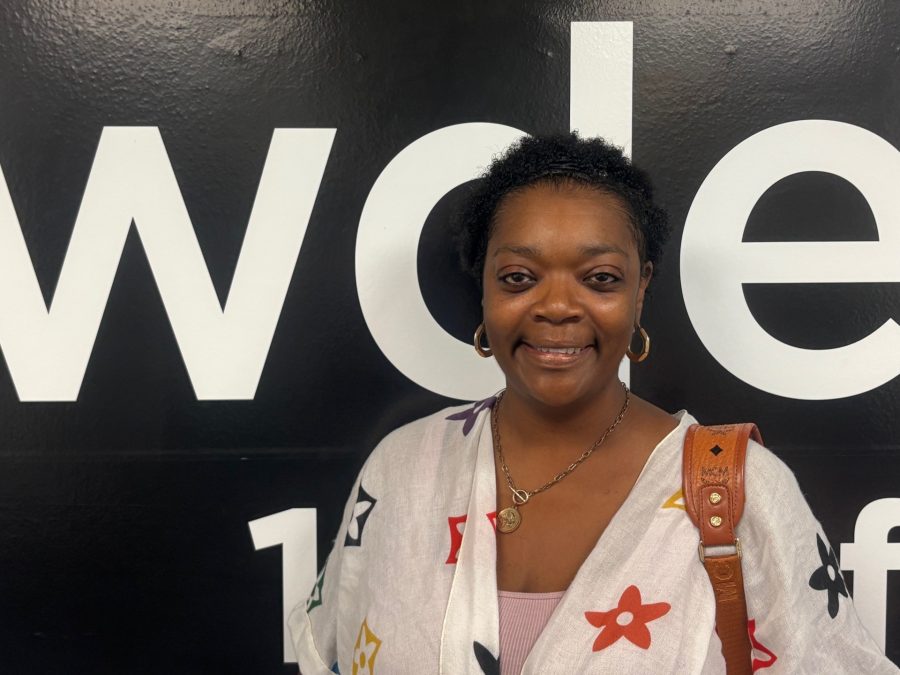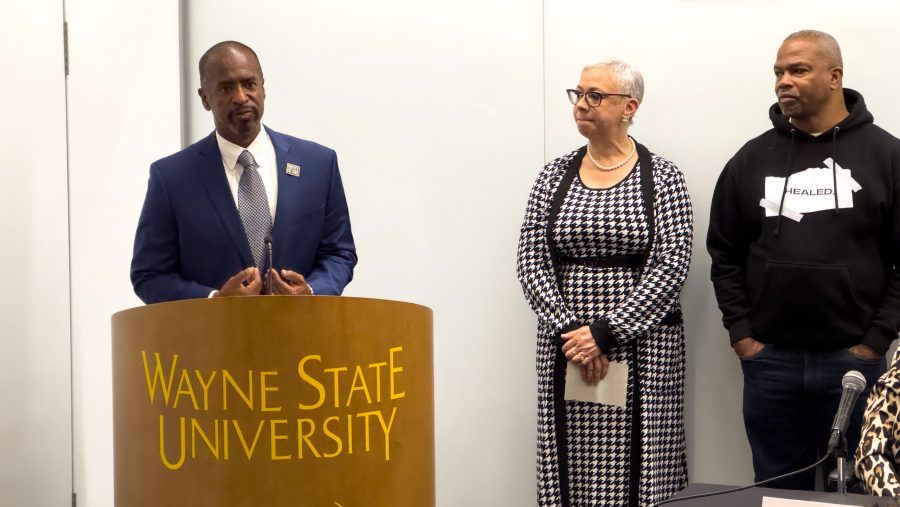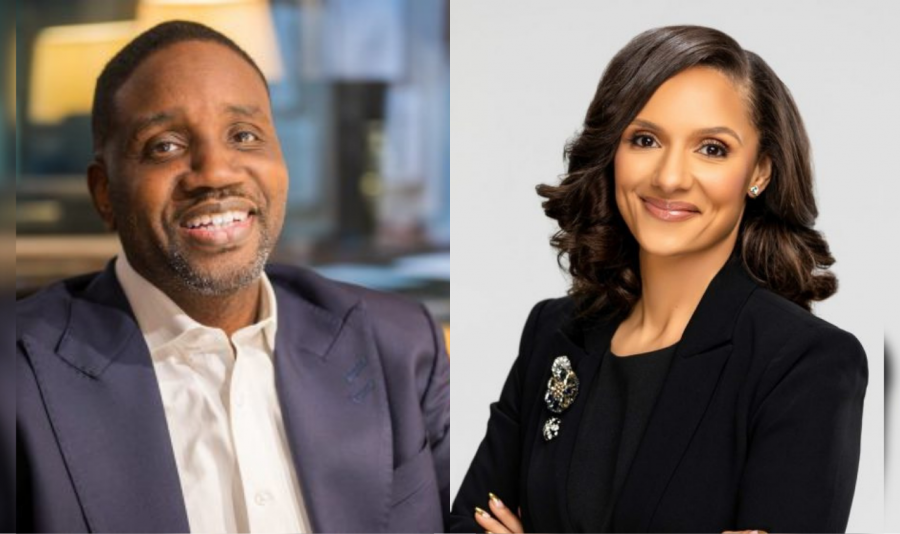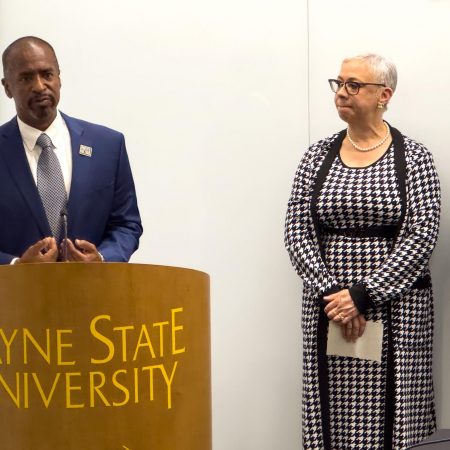Councilman Scott Benson says he wants more time in office to bring jobs, better infrastructure to northeast Detroit
In about a month Detroiters vote to re-shape the city’s government.
After a dozen years, a new mayor will lead the Motor City.
But Detroit City Council member Scott Benson hopes one thing stays the same. The incumbent is running for reelection to represent northeast Detroit.
Benson says Council District 3 faces a flood of problems, including dealing with actual and sometimes massive flooding.
Listen: Councilman Scott Benson says he wants more time in office to bring jobs, better infrastructure to northeast Detroit
The following interview has been edited for length and clarity.
Scott Benson: We still have to help with public safety, we still need to help with jobs. We still need to help grow our infrastructure. We need to reboot our infrastructure, in many ways. Our infrastructure is hundreds of years old in certain places within the city of Detroit. And you don’t see it, so it’s easy not to think about it. When we look at stormwater infrastructure, advocating for new pipes, advocating for green stormwater to make us a more resilient space, that takes work. And it doesn’t happen without the heavy lifting and being very strategic and prescriptive around how we rebuild our city from underneath the ground as well. We can get the development from private investment. But the infrastructure, that’s public investment. We have to work with the state, the county and the federal government, which has its ebbs and flows, as we all know. We have to work with all those partners to make sure that we continue to invest in our infrastructure.
Quinn Klinefelter, WDET News: When you are trying to pay for that work, there’s been a lot of talk about the so-called “financial cliff” the city’s facing because federal and other sources of funding are running out. In your view, what should the city do to get more revenue in?
SB: I want to go back to that statement about the financial cliff. I am a fiscal hawk on the Detroit City Council. We have been very strategic in how we utilize that federal funding. It was used as icing and not the cake. We have lived beneath our means in the city of Detroit. I want to continue to ensure we do that we save more than we spend. And we just saw where the mayor made the announcement that we got about a $60 million surplus that we’re going to reprogram this year. So we are in a position where we’re not worried about the loss of federal money.
To get more money in, we’re going to have to continue what we’ve done. Since I’ve been on the Detroit City Council there’s been over a 50% increase in the General Fund. We need to continue that growth. Which means we need more investment, we need to continue population growth. And that’s how we grow our General Fund.
QK: Some of the Detroit mayoral candidates have talked about possibly raising taxes on certain things in the downtown or other areas. What do you think of those proposals?
SB: The one that I’m thinking of is a tax on events. I’m not opposed to that. I believe the thought is that we would use that revenue to offset other tax obligations. It would be an additional opportunity to reduce property taxes. We have to figure out a way to reduce the cost to live in the city of Detroit when it comes to operating a home. We have to incentivize people to move back into the city of Detroit. And our property taxes and our car insurance, that’s a disincentive. We need to figure that part out. But having a tax of that nature, it hits on the downtown-specific events and it’s something that’s been done successfully around the country. So I am more than happy to take a look at how we can implement something like that in the city of Detroit.
If we want to grow our city, we have to do it by bringing in everybody.
QK: When I talk to some people around the city, they still bring up the specter of crime. They fear sometimes being in their own neighborhoods, including over in your district, which I go through every single day. In your view, what can be done about that? I know you favor the ShotSpotter system, which is supposed to alert police when it detects gunfire. And there’s lots of talk about community policing. But if you do something like add more personnel to the police department, that would take extra money. So what do you see as the best ways to address crime?
SB: ShotSpotter was something that I championed back in 2015, before it was cool. CVI, community violence intervention, I’ve also championed that in the third district. and we’ve seen results. So I continue to champion those items. We’ve given a pay raise to our police department so that we can keep and attract additional police officers. But we’re going to have to continue to leverage those items because we are not a wealthy district. We don’t have any of the traditional sexy neighborhoods. But we see a huge brunt of the crime, which means that my bosses, the residents, are often victims of crime. And when you tell other people, “Hey, come to the city. We’ve got all these assets, the quality of life that you’re looking for.” People say crime, either real or perceived, is an issue. If we want to grow our city, we have to do it by bringing in everybody. Income diversity is something that we need here in the city of Detroit.
QK: You’d been caught up in some controversy a while back as part of a federal corruption investigation into several public officials in the city over bribery allegations. They charged former Detroit City Council Member Andre Spivey with that. But they closed other cases at the beginning of this year with no charges filed against anyone else, including yourself. Do you feel exonerated after all that? Or are there any lingering concerns that somehow you could have been tarnished to where opponents can try to throw something at you about it?
SB: Any time that the federal government comes to your house unannounced, that’s a problem. But the grand jury did not indict anyone in my office, in my colleague’s office, none of us. The federal government even provided a letter indicating they were dropping the investigation, which it rarely, rarely does. There’s always going to be that. “Oh, your name was spoken with those words.” But you know what? They took a very deep dive into me, my personal finances. And we came up clean. My team came up clean, my colleague’s team came up clean. So I do feel exonerated.
QK: One thing I try to always ask anybody that’s running for office is why people should vote for them. So what would you tell voters? Why should they reelect you to Council?
SB: Number one, I have added value to my district when it comes to jobs. And I am all about jobs. My three priorities are jobs, jobs and more jobs. And we are not a typical area where people think about investment. Because we are overwhelmingly low-income in the third district, it does not mean that we are low-quality. I fought for the “Dining with Confidence” ordinance when I saw there were a number of major restaurant chains that thought they could serve residents on the northeast side of Detroit poisoned food, improper food. I fought very hard and lost once but won the second time to get an ordinance that holds restaurants accountable. They have to publicize their scores when it comes to their food compliance and food safety. It’s not just about being treated well in the downtown area. We pay taxes on the northeast side of Detroit as well.
Trusted, accurate, up-to-date.
WDET strives to make our journalism accessible to everyone. As a public media institution, we maintain our journalistic integrity through independent support from readers like you. If you value WDET as your source of news, music and conversation, please make a gift today.Donate today »
More election coverage

Janeé Ayers seeks return to Detroit City Council
Former council member is challenging two incumbents who beat her in 2021. She’s confident voters will give her another chance.

Councilman Scott Benson says he wants more time in office to bring jobs, better infrastructure to northeast Detroit
Incumbent Scott Benson is running for reelection to represent northeast Detroit. He says Council District 3 faces a flood of problems, including dealing with actual and sometimes massive flooding.

University of Michigan, Outlier Media survey asks residents what they want Detroit’s next mayor to focus on
A new survey reveals the top concerns Detroiters would like to see the next mayor address.
The post Councilman Scott Benson says he wants more time in office to bring jobs, better infrastructure to northeast Detroit appeared first on WDET 101.9 FM.
